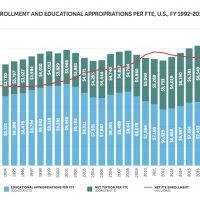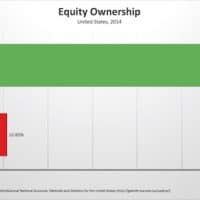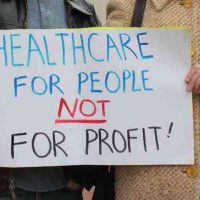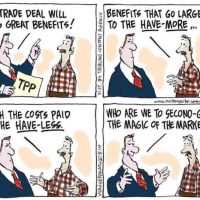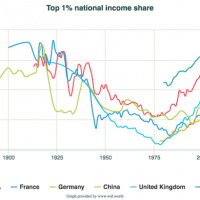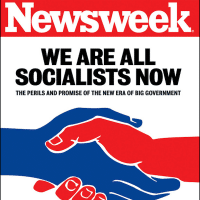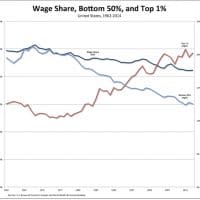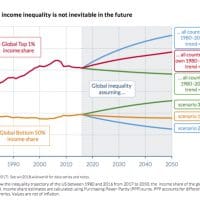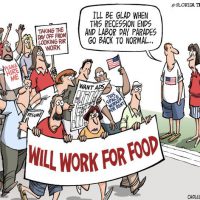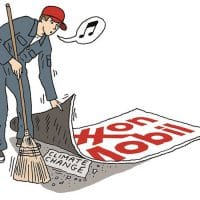-
Privitization of public education
For the first time in American history, students in more than half of all U.S. states are paying more in tuition to attend public colleges or universities than the government contributes.
-
Buyback this!
I have been arguing, since 2016, that one of the likely outcomes of the kind of corporate tax cuts Donald Trump and his fellow Republicans have supported—and, as we saw, eventually rammed through—would be an increase in inequality.
-
Utopia and healthcare (part 2)
The dystopia of the American healthcare system certainly invites a utopian response—a ruthless criticism as well as a vision of an alternative.
-
Utopia and healthcare (part 1)
I’ve written quite a bit about the U.S. healthcare dystopia over the years—including a seven-part series back in 2016.* But I haven’t yet addressed the utopian dimensions of healthcare reform.
-
Utopia and trade
Donald Trump’s decision to impose import tariffs—on solar panels and washing machines now, and perhaps on steel and aluminum down the line—has once again opened up the war concerning international trade.
-
Utopia and inequality
Economic inequality is arguably the crucial issue facing contemporary capitalism—especially in the United States but also across the entire world economy.
-
We’re #2!
According to the Tax Justice Network, the United States ranks second in the 2018 Financial Secrecy Index. This is based on a secrecy score of 59.8, which is practically unchanged from 2015. The only country ahead of the United States is Switzerland, with a secrecy score of 76. The rise of the United States continues a long-term trend, as the country was one of the few to increase their secrecy score in the 2015 index.
-
Utopian socialism
Just nine years ago, in the midst of the Second Great Depression, Newsweek declared that “we are all socialists now.”
-
What goes up…
Take the stock market, for example. Last Friday, the Dow Jones Industrial Average closed down 666 points, or 2.5 percent, its biggest percentage decline since the Brexit turmoil in June 2016 and the steepest point decline since the 2008 financial crisis.
-
Utopia and populism
My view is that liberal critics of populism, standing on their heads, get it wrong. If made to stand on their feet, they’d have to admit that populism actually represents the failure of liberal democracy.
-
Utopia and the right to be lazy
Students are much too busy to think these days. So, when a junior comes to talk with me about the possibility of my directing their senior thesis, I ask them about their topic—and then their schedule. I explain to them that, if they really want to do a good project, they’re going to have to quit half the things they’re involved in.
-
What’s the matter with America?
Last week, Thomas Frank welcomed Paul Krugman to the ranks of those who believe that the American working-class in recent decades has often voted against its fundamental economic interests by supporting conservative Republicans.
-
The elephant in the world
The authors of the report confirm what Branko Milanovic and others had previously discovered: that a representation of the unequal gains in world economic growth in recent decades looks like an elephant. Thus, the real incomes of the bottom 50 percent of the world’s population (except the poorest, at the very bottom) have increased, the incomes of those in the middle (especially the working-class in the United States and Western Europe) have decreased, and the global top 1 percent has captured an outsized portion of world economic growth since 1980.
-
Capitalism and punishment
David Russio takes a look into the punishments (deaths) that come from capitalism. For is it really bringing balance to the destruction that it causes. That seems to be the loaded question we all know the answer to.
-
Where has all the surplus gone?
Thanks to the release of the so-called Paradise Papers, and the additional research conducted by Gabriel Zucman, Thomas Tørsløv, and Ludvig Wier, we know that a large share of the surplus captured by corporations is artificially shifted to tax havens all over the world.
-
Reconcile this
The world joined most South Africans in cheering when Nelson Mandela was finally released from prison, the apartheid regime was largely dismantled, and multiracial elections were eventually held.
-
Laughter is the best medicine
Only mainstream macroeconomists could possibly have thought that capitalism is self stabilizing. The rest of us—who have read Marx and Keynes…—actually knew something about the roots of capitalist instability.
-
Promises, promises
They keep promising, ever since the recovery from the Great Recession started more than eight years ago, that workers’ wages will finally begin to increase. But they’re not.
-
Who’s working for Facebook?
There are plenty of reasons to be interested in—and, even more, concerned about—Facebook. Many of them are raised in the recent review of Facebook-related books by John Lanchester [ht: db]: the fragmentation of the polity (via the targeting of posts), the dissemination of “fake news” (which played an important role in the 2016 U.S. presidential election), the undermining of other livelihoods (such as journalism and music), the level of surveillance of users (much more than any national government), the violation of anti-monopoly rules (via individualized pricing), and so on.
-
Slick maneuvers
Both ExxonMobil and the Wall Street Journal have been engaged in pretty slick maneuvers in order to protect their profits by failing to publish any opinions critical of ExxonMobil.

